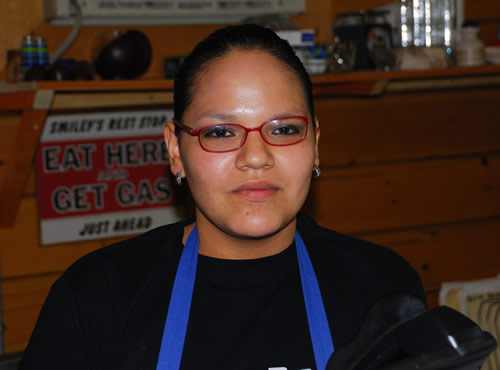
From La Crosse, Wisconsin up through Minneapolis, neatly partitioned farms punctuate the highway. I stop for lunch in Minneapolis and am reminded of the summer trips my sister and I took with our mother to visit our grandmother in Salt Lake City, Utah. I remember the creamy tea we had while we waited to re-board the airplane.
Driving NW of Minneapolis the land becomes less green, less lush, and a whole lot flatter. Lake after lake appears and finally I stop to give my cattle dog a swim in one of them, Otter River Lake. I hear one loon call to another, with its sweet, lonely cry.
I enter the White Earth Reservation, 1,300 square miles of prairie, where maple-basswood forest and boreal pine forest all intersect. Named the White Earth Reservation, or Gahwahbahnikag, for the white clay that underlies part of it. It is also the land of rice. Wild rice.
I call the offices of the reservation and someone directs me to a young woman involved in the White Earth Land Recovery Project who works at a small store and restaurant called Native Harvest. An hour later, I pull up in front of a decorative, colorful teepee and a young Native woman in a blue, cotton dress greets me at the door of the trading post shaking my hand gently while averting her eyes. This is the Native variation of the in-your-face greeting and firm handshake my father taught me as a child.
Ashley Lee Martin: When I was very young I would go out with my grandparents on Rice Lake. Ricing is a community event and we don’t just do it for the money. It is an old tradition, a way of life for us.
My grandmother was always in the front of the canoe, scrunched on her knees. Then me in the middle, my grandfather pushing the canoe offshore, and then jumping in the boat behind us. My grandfather would pole toward the wild rice beds; he was at least a head taller than the stalks of rice. My grandmother would use a stick to bring the stalks over her lap and tap them with a smaller stick. The rice would fall off onto the bottom of the canoe. I can still hear the sound. On a good day they brought in hundreds of pounds of rice. Online at: Native Harvest.com and White Earth Tribal Court.com
Mix together wild rice, onion, carrots, celery, pepper, and water. Pour ingredients into stew pot with chicken on top and cook for one hour on stove. Turn off heat, remove chicken and carefully de-bone. Return chicken to pot, then add salt and pepper to taste, sautéed garlic, fresh basil, dill, and Dijon mustard according to tastes and cook until tender.
Chicken Wild Rice Soup (Manoomin Baaka’akwe Naboob)
- 1 ½ cups Native Harvest wild rice
- 1 large onion, diced
- 5 carrots, thinly sliced
- 2 stalks celery, diced
- 1 green pepper, diced
- 1 whole stewing chicken
or chicken pieces
- 6 cups water
- Sautéed garlic, basil, dill
& Dijon mustard to taste
